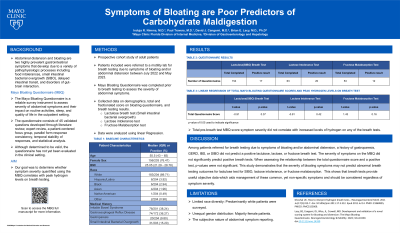Monday Poster Session
Category: Small Intestine
P2634 - Symptoms of Bloating Are Poor Predictors of Carbohydrate Maldigestion
Monday, October 23, 2023
10:30 AM - 4:15 PM PT
Location: Exhibit Hall

Has Audio
- IN
Induja R. Nimma, MD
Mayo Clinic
Jacksonville, FL
Presenting Author(s)
Induja R. Nimma, MD, Paul Travers, MD, David Cangemi, MD, Brian Lacy, MD, PhD, FACG
Mayo Clinic, Jacksonville, FL
Introduction: Abdominal distension and bloating are two highly prevalent gastrointestinal symptoms that develop due to a variety of pathophysiologic processes including food intolerances, small intestinal bacterial overgrowth (SIBO), delayed intestinal transit, and disorders of gut-brain interaction. The Mayo Bloating Questionnaire (MBQ) is a novel validated tool designed to quantify the severity of abdominal bloating and distension and evaluate the impact of these symptoms on patients’ lives. While proven easy to use, valid, and reliable, this tool has yet to be evaluated in clinical practice. Our goal was to determine whether symptom severity quantified using the MBQ correlates with peak hydrogen levels on breath testing.
Methods: This was a prospective cohort study of adult patients referred to the motility lab for breath testing due to symptoms of bloating and/or abdominal distension between July 2022 and May 2023. Patients completed the MBQ prior to breath testing. Collected data included demographics, total and fractionated score on the bloating questionnaire, and breath test (lactose, fructose, lactulose) results. Comparisons between groups were made using linear regression.
Results: 204 consecutive patients were evaluated; 154 completed the lactulose breath test for bacterial overgrowth (17 positive), 63 completed the lactose intolerance test (20 positive), and 53 completed the fructose malabsorption test (12 positive). Some patients underwent multiple tests. Demographic data are listed in table 1. Total MBQ scores on pre-breath test symptom severity did not correlate with increased levels of hydrogen on any of the breath tests. (Lactulose testing: p-value 0.37, lactose intolerance: p-value 0.42, and fructose malabsorption: p-value 0.16).
Discussion: Among patients referred for breath testing due to symptoms of bloating and/or abdominal distension, a history of gastroparesis, GERD, IBS, or SIBO did not predict a positive lactulose, lactose, or fructose breath test. The severity of symptoms on the MBQ did not significantly predict positive breath tests. When assessing the relationship between the total questionnaire score and a positive test, p-values were not significant. This study demonstrates that the severity of bloating symptoms does not correlate with the presence of abnormality on breath testing for lactose intolerance, fructose intolerance, or a lactulose test for SIBO. Thus, breath tests provide useful objective data which aids management of these common, yet non-specific symptoms.
Disclosures:
Induja R. Nimma, MD, Paul Travers, MD, David Cangemi, MD, Brian Lacy, MD, PhD, FACG. P2634 - Symptoms of Bloating Are Poor Predictors of Carbohydrate Maldigestion, ACG 2023 Annual Scientific Meeting Abstracts. Vancouver, BC, Canada: American College of Gastroenterology.
Mayo Clinic, Jacksonville, FL
Introduction: Abdominal distension and bloating are two highly prevalent gastrointestinal symptoms that develop due to a variety of pathophysiologic processes including food intolerances, small intestinal bacterial overgrowth (SIBO), delayed intestinal transit, and disorders of gut-brain interaction. The Mayo Bloating Questionnaire (MBQ) is a novel validated tool designed to quantify the severity of abdominal bloating and distension and evaluate the impact of these symptoms on patients’ lives. While proven easy to use, valid, and reliable, this tool has yet to be evaluated in clinical practice. Our goal was to determine whether symptom severity quantified using the MBQ correlates with peak hydrogen levels on breath testing.
Methods: This was a prospective cohort study of adult patients referred to the motility lab for breath testing due to symptoms of bloating and/or abdominal distension between July 2022 and May 2023. Patients completed the MBQ prior to breath testing. Collected data included demographics, total and fractionated score on the bloating questionnaire, and breath test (lactose, fructose, lactulose) results. Comparisons between groups were made using linear regression.
Results: 204 consecutive patients were evaluated; 154 completed the lactulose breath test for bacterial overgrowth (17 positive), 63 completed the lactose intolerance test (20 positive), and 53 completed the fructose malabsorption test (12 positive). Some patients underwent multiple tests. Demographic data are listed in table 1. Total MBQ scores on pre-breath test symptom severity did not correlate with increased levels of hydrogen on any of the breath tests. (Lactulose testing: p-value 0.37, lactose intolerance: p-value 0.42, and fructose malabsorption: p-value 0.16).
Discussion: Among patients referred for breath testing due to symptoms of bloating and/or abdominal distension, a history of gastroparesis, GERD, IBS, or SIBO did not predict a positive lactulose, lactose, or fructose breath test. The severity of symptoms on the MBQ did not significantly predict positive breath tests. When assessing the relationship between the total questionnaire score and a positive test, p-values were not significant. This study demonstrates that the severity of bloating symptoms does not correlate with the presence of abnormality on breath testing for lactose intolerance, fructose intolerance, or a lactulose test for SIBO. Thus, breath tests provide useful objective data which aids management of these common, yet non-specific symptoms.
Disclosures:
Induja Nimma indicated no relevant financial relationships.
Paul Travers indicated no relevant financial relationships.
David Cangemi indicated no relevant financial relationships.
Brian Lacy: AbbVie, Inc. – Advisory Committee/Board Member, Investigator-initiated funding. Ardelyx, Inc. – Advisory Committee/Board Member. Bausch – Investigator-initiated funding. Gernelli – Advisory Committee/Board Member. Ironwood Pharmaceuticals Inc. – Advisory Committee/Board Member, Investigator-initiated funding. Salix – Advisory Committee/Board Member, Investigator-initiated funding. Sanofi – Advisory Committee/Board Member.
Induja R. Nimma, MD, Paul Travers, MD, David Cangemi, MD, Brian Lacy, MD, PhD, FACG. P2634 - Symptoms of Bloating Are Poor Predictors of Carbohydrate Maldigestion, ACG 2023 Annual Scientific Meeting Abstracts. Vancouver, BC, Canada: American College of Gastroenterology.
